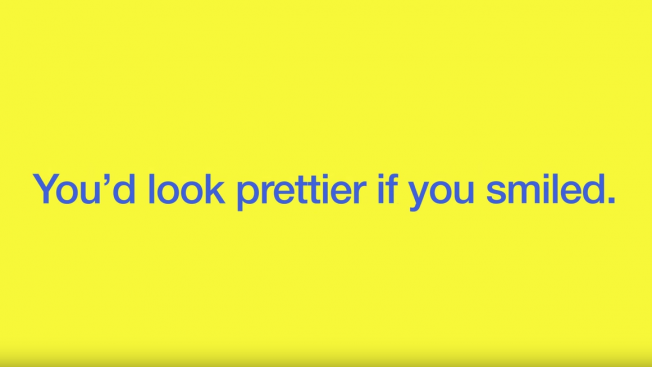PSAs From MTV Show How Everyday Phrases Keep Bias in the Mainstream
Posted in: Uncategorized
The latest installment of MTV’s “Look Different” anti-bias campaign looks a whole lot different than last month’s showing, an over-the-top, multichannel satire about a Geek Squad-style team of uber-white corporate consultants eager to help people of color hail cabs, rent apartments and handle courtroom appearances.
Now, fresh PSAs and digital assets tackle gender bias in starker, more straightforward terms. They invite viewers to consider the unintended consequences of various preconceptions and misconceptions that may, to some people, appear benign, but can actually cause a great deal of harm.
In series of 30-second ads, phrases in blue flash across a canary-yellow screen. They include: “This is a man’s job,” “She’ll hook up with anyone,” “You’d look prettier if you smiled,” “She’s built like a man,” and “Boys don’t cry.”
We’ve all heard, and probably even used, at least some of this language in casual conversation. In that context, the biased nature of the words can easily be ignored or, at times, not even register. But strung together over a half-minute ad with no storyline, splashy visuals and special effects as distractions, the cumulative effect hits home.
MTV has also beefed up its online tools, adding an “Implicit Bias Quiz.” The quiz was designed with Harvard’s Project Implicit and features images of Emma Watson, Aziz Ansari, Mindy Kaling and others. At first, the test seems ridiculously simple, but it took about 20 seconds for my own bias to seep through. There’s also a “Gender Bias Cleanse,” developed with the Kirwan Institute, that suggests activities like setting nonstereotypical images as screensavers.
“The majority of millennials are aware of gender bias throughout society,” explains MTV public affairs chief Ronnie Cho. “But many do not recognize how pervasive and insidious it truly is and need support in identifying ways to tackle it.”
(A new national study touted by MTV found that three-quarters of young people believe openly discussing gender bias would be helpful, but only one-quarter know where to turn for information about the subject or tools to help them deal with such issues.)
This new initiative makes inroads by prompting viewers to contemplate their own biases and consider the cues that perpetuate stereotypes and allow prejudice to fester. After all, self-awareness is the first step on the road to enlightenment. Here, the network challenges viewers to take that journey without seeming heavy-handed or judgmental.

Post a Comment